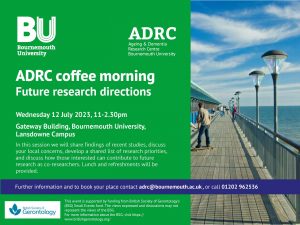The Ageing and Dementia Research Centre (ADRC) at Bournemouth University currently run a monthly coffee morning for local older people and others interested in ageing and dementia research to socialise and discuss and share feedback on our work. We have received funding from the British Society of Gerontology (BSG) Small Events Fund to run the session on 12th July (11am-2.30pm) at Bournemouth Gateway Building to enable us to build upon our current model and support the development of a team of older people as co-researchers to take forwards research that is a priority for them.

The aim of this event is to:
1. Disseminate the findings of research projects undertaken by Bournemouth University Ageing and Dementia Research Centre to local older people.
2. Discuss concerns of local older people to support development of an ageing and dementia research priority list.
3. Identify older people interested in becoming co-researchers to take forwards ideas from the ageing and dementia research priority list.
To book a place visit www.eventbrite.co.uk/e/future-directions-in-ageing-research-tickets-654816091557
For further information on this event please contact mheward@bournemouth.ac.uk
Funding statement and Disclaimer: This event is supported by funding from British Society of Gerontology’s (BSG) Small Events fund. The views expressed and discussions may not represent the views of the BSG. For more information about the BSG, click here: https://www.britishgerontology.org/












 Beyond Academia: Exploring Career Options for Early Career Researchers – Online Workshop
Beyond Academia: Exploring Career Options for Early Career Researchers – Online Workshop UKCGE Recognised Research Supervision Programme: Deadline Approaching
UKCGE Recognised Research Supervision Programme: Deadline Approaching SPROUT: From Sustainable Research to Sustainable Research Lives
SPROUT: From Sustainable Research to Sustainable Research Lives BRIAN upgrade and new look
BRIAN upgrade and new look Seeing the fruits of your labour in Bangladesh
Seeing the fruits of your labour in Bangladesh ECR Funding Open Call: Research Culture & Community Grant – Apply now
ECR Funding Open Call: Research Culture & Community Grant – Apply now ECR Funding Open Call: Research Culture & Community Grant – Application Deadline Friday 12 December
ECR Funding Open Call: Research Culture & Community Grant – Application Deadline Friday 12 December MSCA Postdoctoral Fellowships 2025 Call
MSCA Postdoctoral Fellowships 2025 Call ERC Advanced Grant 2025 Webinar
ERC Advanced Grant 2025 Webinar Update on UKRO services
Update on UKRO services European research project exploring use of ‘virtual twins’ to better manage metabolic associated fatty liver disease
European research project exploring use of ‘virtual twins’ to better manage metabolic associated fatty liver disease